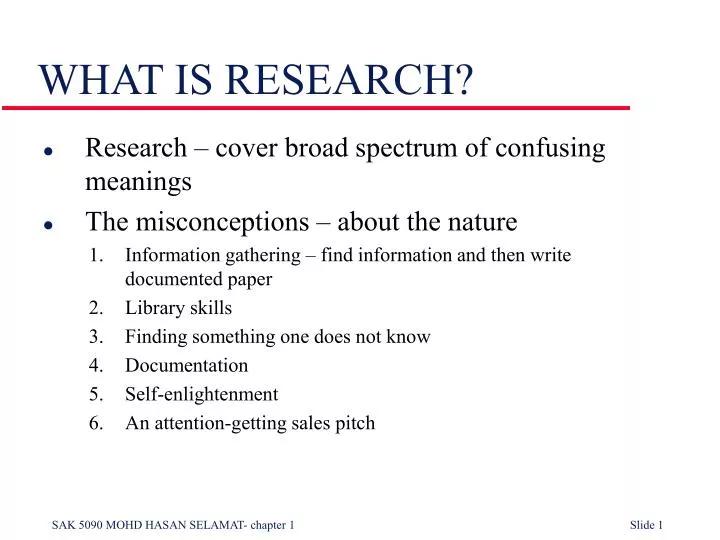

WHAT IS RESEARCH?
May 13, 2012
730 likes | 3.53k Views
WHAT IS RESEARCH?. Research – cover broad spectrum of confusing meanings The misconceptions – about the nature Information gathering – find information and then write documented paper Library skills Finding something one does not know Documentation Self-enlightenment
Share Presentation
- specific plan
- specific research problem
- draw conclusion
- electrical power

Presentation Transcript
WHAT IS RESEARCH? • Research – cover broad spectrum of confusing meanings • The misconceptions – about the nature • Information gathering – find information and then write documented paper • Library skills • Finding something one does not know • Documentation • Self-enlightenment • An attention-getting sales pitch
WHAT IS RESEARCH? • Research has mystique • Exclusive • Esoteric & aloof individuals • In laboratories • Scholarly libraries • Ivory towers • Within the precincts of an academic environment • Therefore, public unaware of their contribution to quality of life & general welfare
WHAT RESEARCH IS NOT • Research is not mere information gathering (discovery) • Research is not mere transportation of facts from one location to another. • Draw conclusion or interpret the facts themselves. • Fact discovery, fact transportation, and fact transcription. • Missed the essence of research: the interpretation of data.
WHAT RESEARCH IS NOT • Research is not merely rummaging for information – example of “house for sale” sign board • Research is not a catchword, used to get attention YEARS OF RESEARCH HAVE PRODUCED A NEW CAR WASH! GIVE YOUR CAR A MIRACLE SHINE WITH SOAPY SUDS!
WHAT TRUE RESEARCH IS Research is a procedure by which we attempt to find systematically, and with the support of demonstrable fact, the answer to a question or the resolution of a problem. Has EIGHT distinct characteristics: • Originates with a question. • Demands a clear articulation of a goal. • Requires a specific plan of procedure. • Usually divides the principal problem into more manageable subproblems.
WHAT TRUE RESEARCH IS • Is tentatively guided by research problem, research questions, or hypotheses. • Accepts certain critical assumptions. • Will countenance only hard, measurable data in attempting to resolve the problem that initiated the research. • By its nature, circular; or, more exactly, helical.
(1) Originates with a question or problem • Originates with a question in the mind of the researcher. • The world is filled with unanswered questions, unresolved problems. • Things that cause us to wonder, to speculate, to ask questions. • Igniting a chain reaction that terminates in the research process. • Inquisitive mind is the beginning of research. • Do not know, do not understand. • Why? What’s the cause of that? What does it all mean?
(2) Requires clear articulation of a goal • Cannot proceed without a clear articulation of a goal. • A clear, unambiguous statement of the problem. • An exercise in intellectual honesty. • Must set forth in a grammatically complete sentence exactly what the ultimate goal of the research • Basic for the success. • Without it, research is on shaky ground.
(3) Requires a specific plan for proceeding • Requires a specific plan of procedure. • Not an excursion into happy expectation, a carefully planned attack, search-and-discover mission explicitly planned. • Logically designed. • How do you propose to reach that goal? • Must not wait until one is chin-deep. • Formative stages, much that can be decided: Where are the data?
(3) Requires a specific plan for proceeding (cont.) • Any existent data that address themselves. • It is reasonable, have access to them. • What will you do with them after they are in your possession? • Cannot be postponed. • Procrastination has no place in the agenda.
(4) Divides the principal problem into subproblems • Dividing it into more manageable subareas. • Whole is composed of the sum of its parts. • We break down much more frequently than we realize. • To proceed logically, should closely inspect the principal problem, soon cause the appropriate, necessary subproblems to float naturally. • Many researchers take neither the time nor the trouble to isolate the lesser problems, their research projects become cumbersome and unwieldy.
(4) Divides the principal problem into subproblems (cont.) • It is expedient to reduce the main problem to a series of logical subproblems. • Example: Getting to another town 50km away • Main problem: How do I get there? • Subproblems: • What is the direct route? • How far do I travel on highway? • Which exit number should I take?
(5) Guided by specific research problem, question, or hypothesis • Seeks direction through appropriate hypotheses based upon obvious assumptions. • Each of the subproblems is then viewed through a construct called a hypothesis. • Logical supposition, reasonable guess, an educated conjecture. • Direct your thinking to the possible source of facts that will aid in resolving the research problem. • Nothing new. • They are constant, recurring features of everyday life. • Natural working of the human mind.
(5) Guided by specific research problem, question, or hypothesis (cont.) Example: table lamp. Find the switch. You turn it. No light. Begin to construct a series of reasonable guesses. 1. The bulb has burned out. 2. The lamp is not plugged into the wall outlet. 3. A late afternoon thunderstorm interrupted the electrical service. 4. The wire from the lamp to the wall outlet is defective. 5. You forgot to pay your electric bill. These hypotheses provides a direction for exploration.
(5) Guided by specific research problem, question, or hypothesis (cont.) Never proved nor disproved; either supported or not supported. 1. You go out to your car, get a flashlight, find a new bulb, and insert the new bulb. The lamp fails to light. (Hypothesis 1 is rejected.) 2. You glance down at the wall outlet and the lamp is plugged into it. (Hypothesis 2 is rejected.) 3. You look at your neighbours’ homes. Everyone has electrical power. (Hypothesis 3 is rejected.)
(5) Guided by specific research problem, question, or hypothesis (cont.) 4. You go back into your home, lift the cord connecting the lamp to the wall socket. The lamp lights briefly, then goes out. You lift the cord again. Again the lamp lights briefly. The connecting cord is defective. (Hypothesis 4 is supported.) 5. Fortunately, hypothesis 4 solved the problem, and by repairing or replacing the cord, you can count on adequate light in the near future.
(5) Guided by specific research problem, question, or hypothesis (cont.) • After the hypotheses, come facts. • Greatest discoveries begun as hypotheses. • Over time, as particular hypotheses are supported by a growing body of data, they evolve into theories. A theory is an organised body of concepts and principles intended to explain a particular phenomenon. • Distinction between a hypothesis and an assumption. • Assumption is a condition that is taken for granted, without which the research situation would be impossible. • Assumptions are self-evident conditions. • For the beginning researcher, it is better to be over-explicit than to take too much for granted.
(6) Accepts critical assumptions • Assumptions are equivalent to axioms in geometry • Assumptions as bedrock upon which the research rest • Essential that others know • Vitally important in judging the quality of the research • Example: to investigate whether students learn the unique grammatical structure of a language more quickly by studying only one foreign language at a time or two concurrently
(6) Accepts critical assumptions • At a minimum the researcher must assume • The teachers used in the study are competent to teach the language or languages in question and have mastered the grammatical structures of the language(s) they are teaching • The students taking part in the research are capable of mastering the unique grammatical structures of any language they are studying • The language selected for the study have sufficiently different grammatical structures that students can recognized and learn to distinguish between them
(7) Requires collection and interpretation of data • Deals with facts and their meaning. • Next step is to collect whatever facts seem appropriate and to organize them in meaningful ways so that they can be interpreted. • Collection of data, not necessarily appropriate for interpretation. • Only facts, events, happenings, observations-nothing more. • These are potentially meaningful. • The significance of the data depends upon the way in which the human brain extracts meaning from those data.
(7) Requires collection and interpretation of data (cont.) • Unprocessed, are worthless in research. • Become a travesty (something that can be joked about). • Data demands interpretation. • No rule, no formula, that will lead the researcher unerringly (accurately) to the correct interpretation. • Subjective: entirely upon the logical mind, inductive reasoning skill, objectivity of the researcher. • Different minds frequently see different meanings in the same set of facts. • An axiom of interpretation that all researchers must recognise.
(7) Requires collection and interpretation of data (cont.) • Once we believed that clocks measured time and that yardsticks measured space. In one sense, they still do. • We further assumed that time and space were two different entities. • Then came Einstein’s theory of relativity, and time and space became locked into one concept: the time-space continuum. • What is the difference between the old perspective and the new perspective? The way we think about, or interpret, the same information. • The realities of time and space have not changed; the way we interpret them has.
(8) Research is, by its nature, cyclical or, more exactly, helical • Is circular • The research process follows a cycle and begins simply and follows logical, developmental steps. • A questioning mind observes a particular situation and asks, Why? What caused that? How come? (Subjective origin of research.) • One question becomes formally stated as a problem. (Overt beginning of research.) • The problem is divided into several simpler, more specific subproblems. • Preliminary data are gathered that appear to bear on the problem. • The data seem to point to a tentative solution of the problem. A guess is made; a hypothesis or guiding question is formed.
(8) Research is, by its nature, cyclical or, more exactly, helical (cont.) • Data are collected, processed, and interpreted. • A discovery is made; a conclusion is reached. • The tentative hypothesis is either supported by the data or is not supported; the question is either answered (partially or completely) or not answered. • The cycle is complete. This is the format of all research.
(8) Research is, by its nature, cyclical or, more exactly, helical (cont.) • Different academic disciplines merely use different routes to arrive at the same destination. • Circle is, however, deceptive. • Accurately helix, or spiral. • One comes across additional problems. • Research begets research. • Dynamic quality.
(8) Research is, by its nature, cyclical or, more exactly, helical (cont.) • NOT One-time act (static), self-contained, an end in itself. • Genuine research creates more problems than it resolves. • The discovery of truth.
Research Methodology • Methodology is the underlying and unifying of any research project • Methodology controls the study, dictates how the data are acquired, arranges them in logical relationships, refining and synthesizing the raw data so that the meaning that lie below the surface of those data become manifest, and yields conclusions, that leads to expansion of knowledge.
- More by User
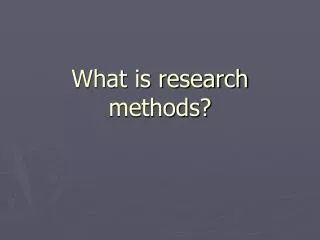
What is research methods?
What is research methods? Reviewing the ads What sorts of methods are used in the advertisements? Which of these is the most trustworthy method? Why? Thinking more about research methods Designed to help prevent mistakes that people naturally make when trying to find out about the world
1.21k views • 30 slides

What is Qualitative Research
Key Epistemological Question: Can the social world be studied with the same methods used in the natural sciences?. YES ? Positivism and deductive researchTheory ?Hypothesis? Collect Data ?Findings ?Hypothesis confirmed or rejected ? Revise theory
313 views • 10 slides
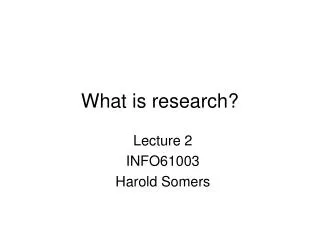
What is research?
What is research?. Lecture 2 INFO61003 Harold Somers . What is research?.
365 views • 19 slides
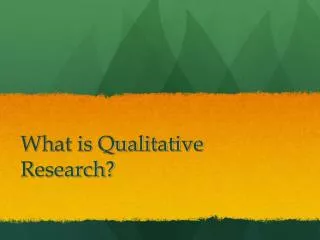
What is Qualitative Research?
What is Qualitative Research?. What is Qualitative Research?. What are you curious about? What questions do you have about your area of study?. What is Qualitative Research?. Key Terms Research: the notion of inquiring into, or investigating something in a systematic manner.
762 views • 44 slides
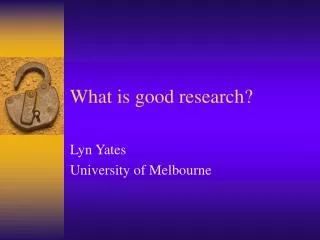
What is good research?
What is good research?. Lyn Yates University of Melbourne. two questions. What does good education research look like?!!! and 2. What does good education research LOOK LIKE?. The ‘evidence-based’ agenda:. USA ‘ No Child Left Behind’ Act 2000 Institute of Education Sciences established
259 views • 10 slides

What is Research?
What is Research?. Research. Word has a broad spectrum of meanings “Research this topic on ….” “Years of research has produced a new ….”. What Research is Not. Not mere information gathering Computer Crime XML for Web Pages
982 views • 17 slides


What is Fundamental Research?
What is Fundamental Research?. Think About It : What factors make you want to purchase a stock?. Understanding Fundamental Analysis. Analyzes a company to determine if the market is undervaluing or overvaluing a company
486 views • 14 slides

What is RESEARCH?
What is RESEARCH?. Take a moment and brainstorm the parts of research:. Take a moment and brainstorm the parts of research:. The Scientific Method (TSM). Everyone has at least heard of The Scientific Method. “ The ” ???. Problems with TSM:. Linear
309 views • 22 slides
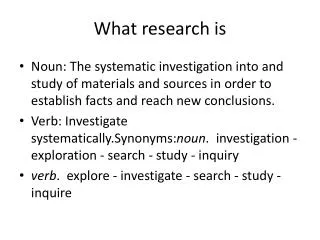
What research is
What research is. Noun: The systematic investigation into and study of materials and sources in order to establish facts and reach new conclusions. Verb: Investigate systematically.Synonyms: noun . investigation - exploration - search - study - inquiry
289 views • 18 slides

What is Research
What is Research. Implement a binary search algorithm A tool for automatic repair programs Is battery drain an important issue for mobile phones Parallelize this program A. Hypothesis. Assumptions. The assumptions of this work are: We assume:
139 views • 6 slides
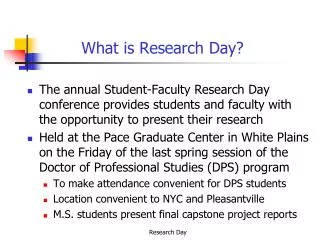
What is Research Day?
What is Research Day?. The annual Student-Faculty Research Day conference provides students and faculty with the opportunity to present their research Held at the Pace Graduate Center in White Plains on the Friday of the last spring session of the Doctor of Professional Studies (DPS) program
148 views • 5 slides

What Is Scholarly Research?
What Is Scholarly Research?. Agenda. What constitutes scholarly research ? Scholarly vs. Popular A Few Samples Parts of a Scholarly Article. What c onstitutes scholarly r esearch ?. Here are some basic characteristics to consider: It is based on original research or experimentation.
338 views • 9 slides
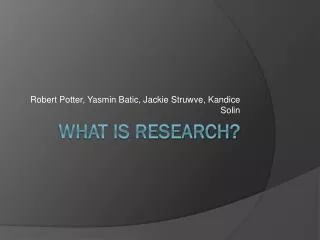
Robert Potter, Yasmin Batic , Jackie Struwve , Kandice Solin. What is Research?. What Research Is Not…. Research is not mere information gathering. Research is not mere transportation of facts from one location to another. Research is not merely rummaging for information.
194 views • 5 slides

What is Research?. More than you know!. EPCC’s IRB needs your attention. The Institution Review Board is charged with insuring that ALL research done at/by EPCC conforms to standards set to protect human subjects. What constitutes research with Human Subjects?.
160 views • 7 slides

What is Research Day?. The annual one-day Student-Faculty Research Day Conference provides students and faculty with the opportunity to present their research
182 views • 6 slides

What is Research?. What are the alternatives to Research?. Benefits. Benefits. In Short…. The good news is…We are already research active. The Trust ‘sponsors’ (leads on) approximately 1 in 4 research projects that are approved (around 200 new projects approved every year).
331 views • 24 slides

What is Research?. Research: A process of Systematic, Scientific Data. Collection Analysis Interpretation So as to find Solutions to a problem. Qualitative Quantitative. Steps in Designing and Conducting. Thinking about topic camulating research question/objective
1.31k views • 74 slides

WHAT IS RESEARCH ?
WHAT IS RESEARCH ?. A systematic approach to finding answers to questions. Steps in Formulating Research. Identify a research problem. Narrow the topic down as much as possible. Review the literature on the topic as completely as possible. State the problem in a question form.
384 views • 19 slides

What is Research?. Research involves developing a topic; identifying and evaluating potential sources of information. Students must be able to use information responsibly, ethically, and legally. Throughout the process, learners must develop, use and revise search strategies.
125 views • 1 slides

Social Science Research in the Middle East: Challenges and Opportunities A presentation by Dr. George Kostopoulos Consultant Education & Technology. What is Research?. Research ? ? Creation of Knowledge. Research = = Discovery of Knowledge.
312 views • 20 slides
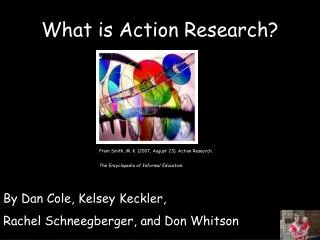
What is Action Research?
What is Action Research?. From Smith, M. K. (2007, August 23). Action Research. The Encyclopedia of Informal Education. By Dan Cole, Kelsey Keckler, Rachel Schneegberger, and Don Whitson. Purpose: Describe action research and its correlation to pedagogy. Today's Roadmap.
632 views • 23 slides

What is action research?
What is action research?. Action research is part of a broad movement that has been going on in education. It is related to the ideas of “reflective practice” where the teacher become researcher. ( Anne Burns, 2010).
1.57k views • 6 slides
